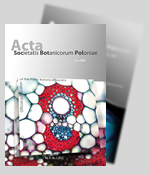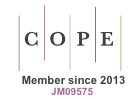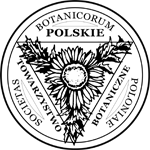Abstract
The experiments were conducted on developing and ripening triticale cv. Dagro caryopses. Increasing capability for precocious germination of the caryopses was seen as development and maturation progressed. A significant role of the embryoless parts of the caryopses (testa, pericarp and endosperm) in preventing germination processes was found. Isolated embryos (after 8 days of incubation) germinated by 100% from the 32nd day after flowering, while only 10% of whole caryopses from this sample germinated. Removal of the outer pericarp strongly stimulated germination of unripe caryopses. However, incising the caryopses near the embryo only slightly stimulated this process, which indicates that hypoxia of the embryo is not the cause of triticale embryo dormancy. Another very sensitive indicator of release of dormancy in the caryopses was the increased synthesis of embryo polyribosomal RNA induced by germination. The results of investigations on RNA synthesis in embryos - which undergoes extreme intensification when germination processes are initiated in the caryopses - were in agreement with those of biological studies based on observation of the elongation of the radicle. The lowest inhibition of transcription in the embryo was found when it was completely separated from the testa, pericarp and endosperm. A smaller effect was seen upon removal of the outer pericarp from developing and ripening caryopses, and decidedly the smallest effect still of incising the caryopses near the embryo.
Keywords
triticale; dormancy; preharvest sprouting; RNA synthesis







